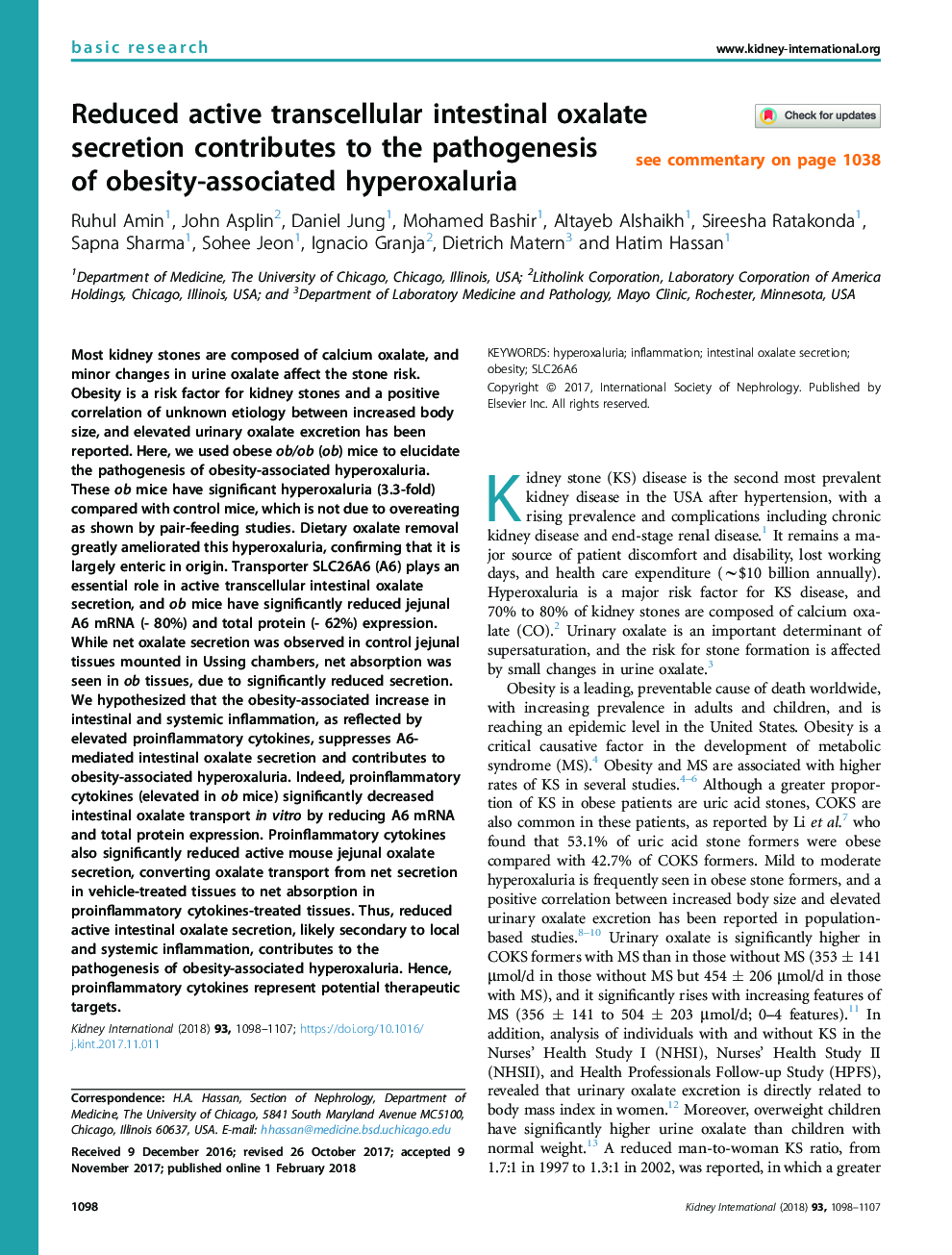| کد مقاله | کد نشریه | سال انتشار | مقاله انگلیسی | نسخه تمام متن |
|---|---|---|---|---|
| 8772699 | 1599139 | 2018 | 10 صفحه PDF | دانلود رایگان |
عنوان انگلیسی مقاله ISI
Reduced active transcellular intestinal oxalate secretion contributes to the pathogenesis of obesity-associated hyperoxaluria
ترجمه فارسی عنوان
ترشح اگزالات عضلانی ترانس سلولی کاهش می یابد و باعث پاتوژنز هیپرسکالورژی مرتبط با چاقی می شود.
دانلود مقاله + سفارش ترجمه
دانلود مقاله ISI انگلیسی
رایگان برای ایرانیان
موضوعات مرتبط
علوم پزشکی و سلامت
پزشکی و دندانپزشکی
بیماریهای کلیوی
چکیده انگلیسی
Most kidney stones are composed of calcium oxalate, and minor changes in urine oxalate affect the stone risk. Obesity is a risk factor for kidney stones and a positive correlation of unknown etiology between increased body size, and elevated urinary oxalate excretion has been reported. Here, we used obese ob/ob (ob) mice to elucidate the pathogenesis of obesity-associated hyperoxaluria. These ob mice have significant hyperoxaluria (3.3-fold) compared with control mice, which is not due to overeating as shown by pair-feeding studies. Dietary oxalate removal greatly ameliorated this hyperoxaluria, confirming that it is largely enteric in origin. Transporter SLC26A6 (A6) plays an essential role in active transcellular intestinal oxalate secretion, and ob mice have significantly reduced jejunal A6 mRNA (- 80%) and total protein (- 62%) expression. While net oxalate secretion was observed in control jejunal tissues mounted in Ussing chambers, net absorption was seen in ob tissues, due to significantly reduced secretion. We hypothesized that the obesity-associated increase in intestinal and systemic inflammation, as reflected by elevated proinflammatory cytokines, suppresses A6-mediated intestinal oxalate secretion and contributes to obesity-associated hyperoxaluria. Indeed, proinflammatory cytokines (elevated in ob mice) significantly decreased intestinal oxalate transport in vitro by reducing A6 mRNA and total protein expression. Proinflammatory cytokines also significantly reduced active mouse jejunal oxalate secretion, converting oxalate transport from net secretion in vehicle-treated tissues to net absorption in proinflammatory cytokines-treated tissues. Thus, reduced active intestinal oxalate secretion, likely secondary to local and systemic inflammation, contributes to the pathogenesis of obesity-associated hyperoxaluria. Hence, proinflammatory cytokines represent potential therapeutic targets.
ناشر
Database: Elsevier - ScienceDirect (ساینس دایرکت)
Journal: Kidney International - Volume 93, Issue 5, May 2018, Pages 1098-1107
Journal: Kidney International - Volume 93, Issue 5, May 2018, Pages 1098-1107
نویسندگان
Ruhul Amin, John Asplin, Daniel Jung, Mohamed Bashir, Altayeb Alshaikh, Sireesha Ratakonda, Sapna Sharma, Sohee Jeon, Ignacio Granja, Dietrich Matern, Hatim Hassan,
